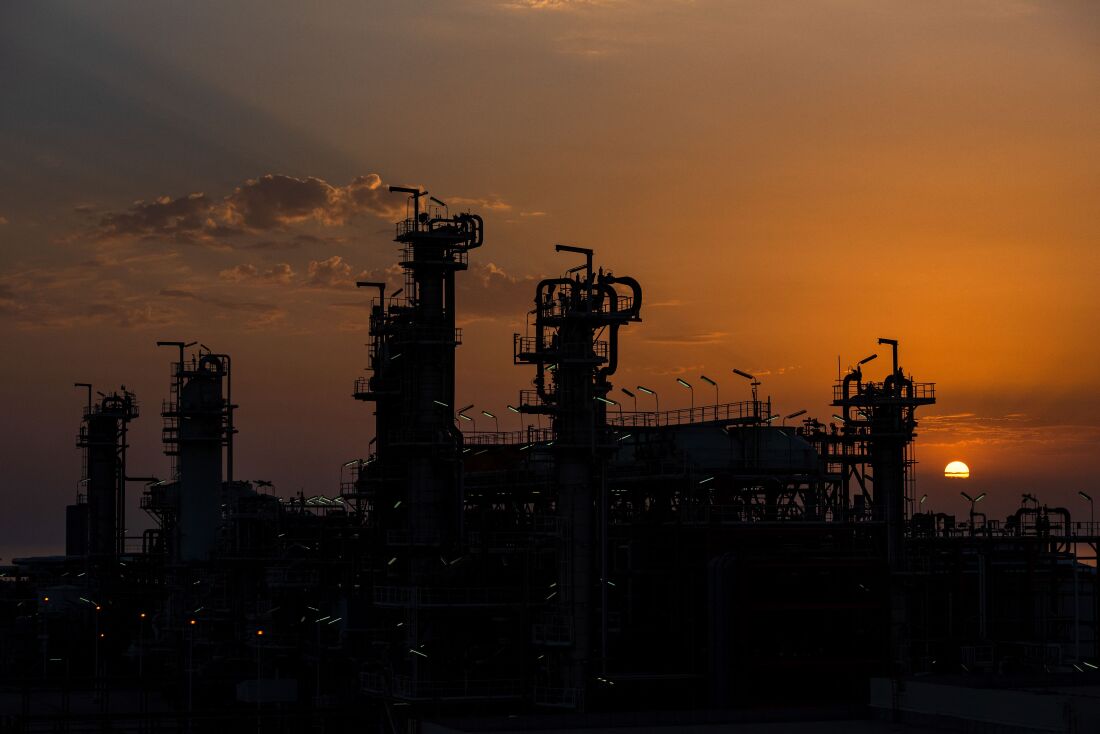
The solar shines behind a refinery within the South Pars Fuel-Condensate area in Asalouyeh Seaport in Iran. Iran’s oil and pure fuel infrastructure is a potential goal for Israeli assaults as tensions within the Mideast mount. Oil costs have risen in consequence — however stay comparatively low, in comparison with most of 2024.
SAEID ARABZADEH/Center East Pictures/AFP through Getty
disguise caption
toggle caption
SAEID ARABZADEH/Center East Pictures/AFP through Getty
International crude oil costs rose by greater than 4% on Wednesday, surging after President Biden informed reporters he was “discussing” the query of whether or not the U.S. would help an Israeli assault on Iranian oil services.
“We’re discussing that,” Biden mentioned. “I think that would be a little … anyway.”
The cryptic comment despatched oil up considerably – besides, costs will not be notably excessive by historic requirements.
Brent, the worldwide benchmark for crude, closed at $77.62, nonetheless decrease than it was for many of 2024.
“In the past, if we’re talking about any kind of conflict in the Middle East that concerned Iran, prices would probably be above $100” a barrel, mentioned Amrita Sen, the founding father of the vitality analysis agency Power Points. “People were talking about, like, $120, $130 crude.”
Though tensions between Israel and Iran are at present as severe as they’ve been for many years, mentioned Sen, “the market has been completely brushing it aside.”
Merchants say the world has oil to spare
Why are markets so sanguine? The most important cause, analysts say, is that the OPEC+ alliance might make much more oil — if it wished.
As a gaggle, OPEC+, a coalition of oil-producing international locations, has an incentive to make much less oil; decrease provide means larger costs. However particular person international locations have a powerful incentive to provide extra oil, which funds their nationwide budgets. Balancing these two competing motivations is the central diplomatic problem of the cartel.
And for just a few years now, the group – and notably Saudi Arabia – have lower manufacturing considerably, attempting to carry up costs. Meaning OPEC+ might, hypothetically, simply make up for lacking Iranian oil.
Rystad Power, an vitality analysis firm, estimates that Iran produces about 4 million barrels of crude per day, and exports about 2 million. OPEC+’s spare capability – the quantity of oil the group might make, however is selecting to not – “currently sits at more than 5 million barrels per day, which could be deployed relatively quickly,” Claudio Galimberti, the chief economist of Rystad Power, wrote in a analysis observe.
Whether or not the alliance would select to deploy that manufacturing is one other query.
Rebecca Babin, a senior vitality dealer with CIBC Non-public Wealth, notes that OPEC+ saved a good lid on manufacturing even after Russia invaded Ukraine and costs spiked. She thinks this time, they’d select to promote extra barrels. In all probability.
“Do we know that they will? Nope,” she mentioned. “And they love to make surprises.” However the chance helps to maintain costs from skyrocketing.
Chinese language demand and U.S. manufacturing reshape the geopolitics of oil
There are just a few different causes for the dearth of alarm.
Oil costs slid dramatically in September, thanks partially to lower-than-expected demand from China’s slowing economic system. China has simply launched an enormous stimulus program, but it surely’s not but clear how a lot that can translate into oil consumption.
In the meantime, the geopolitics of oil have shifted dramatically, formed largely by the shale growth, when new drilling strategies like fracking unlocked huge oil reserves. The U.S. is now the biggest oil producer in historical past, and a internet oil exporter. (Crude exports haven’t been affected by the port strike this week on the East and Gulf coasts of the U.S.)
And since the U.S. is way much less reliant on oil from the Mideast than it was, merchants assume Iran has much less incentive to close down the Strait of Hormuz than it did just a few a long time in the past.
Greater than 1 / 4 of the world’s seaborne crude travels via that waterway, which lies between Iran and the United Arab Emirates. Any blockage would trigger “runaway” oil costs, Galimberti of Rystad Power says.
However it will trigger much less ache to the U.S. than it as soon as would have – and extra ache to Iran and its major buyer, China.
Sen thinks markets are at present underestimating how a lot this battle might upend markets, and that if an assault on oil infrastructure does occur, the value response shall be dramatic. “This is the biggest short the market has ever had,” she mentioned.
Babin thinks the market’s factoring within the dangers nearly proper. In any case, oil markets aren’t waving off these dangers fully. Costs are up greater than $6 this week, a major soar. Babin notes within the choices market, some merchants are inserting bets that will solely repay if costs spike extra.
However general, she mentioned, when she seems on the worth of oil, “I see this as very measured: a market that’s not panicking, not running away with itself. We’re not at $90.”




